
If you want the highest conversion rate, upsells in the cart perform best because shoppers are still browsing and open to adding more before they commit. Checkout upsells need to be simple and low-friction since customers are already in “payment mode.” The thank-you page is perfect for low-pressure post-purchase offers, especially for subscriptions or small add-ons, because buyers are still excited after completing their order.
Timing is everything when it comes to upselling strategies. Whether it’s upselling in cart, just before checkout, or on the thank you page, every approach must be implemented based on your goal.
But which strategy gives the best results? Or a much better question: Which plan is best for you?
Today, through this article, we will understand the three types of upsell strategies: Upsell in cart, checkout, and thank you page, so that you can decide which one works best for you.
But before jumping into it, let’s have a foundational understanding of upselling.
Understanding Upselling: Definition & Benefits
Upselling involves encouraging the customer to buy an upgraded product rather than their original choice or, in some cases, relevant items along with their cart items. If you are a Shopify store owner, upselling is one of the best strategies for increasing your average order value.
Top benefits of upselling
When done right, upselling offers several advantages that go beyond just increasing order value.
Boosts revenue
Encourages customers to spend more per order, directly increasing your average order value and total sales.
Enhances customer experience
Relevant upgrades and exclusive discounts make customers feel valued because they feel like they're getting a great deal.
Maximizes ROI
Upselling existing customers is more cost-effective than acquiring new ones, delivering higher returns with minimal effort.
Improves inventory turnover
Upselling premium or slow-moving items helps clear stock faster and optimize inventory flow.
Strengthens customer loyalty
Offering meaningful add-ons builds trust and satisfaction, leading to repeat purchases and long-term retention.
Now that the definition and benefits of upselling are out of the way, let’s discuss the most commonly used upselling strategies in your customer’s shopping journey.
Upsell in Cart
This type of upselling strategy is implemented on the product page. When customers add something to their cart, before they head to checkout, they're shown a pop-up with an upgrade, related product or a deal. For example, “Add a phone case for just $1.99”
It’s a smart way to boost order value while customers browse and are open to upgrading or adding more items.
Below is an example of a cart pop-up feature in the iCart Cart Drawer Cart Upsell, the upsell app. When the customer added a T-shirt to their cart, a pop-up appeared showing upselling items. Here, the items are shown as a bundle. This motivates the customer to buy the bundle, as it feels like a better deal.
Source: iCart
iCart helps Shopify store owners with pre-purchase upsells and product recommendations. It is the best Shopify upsell app if you want AI-powered recommendations for upsells.
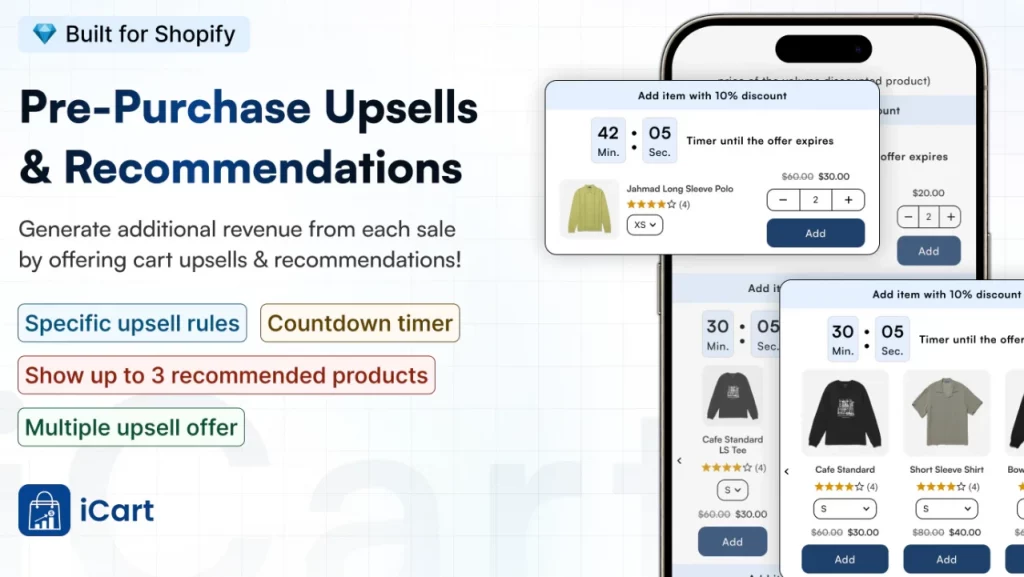
Checkout Upsell
This type of upselling happens during the checkout process. After customers click on “Checkout” but before they complete payment, they’re shown an offer for an upgrade or add-on. For example, “Upgrade to a premium model for just $12.99.”
Shopify upsell at checkout is a seamless way to increase the average order value without interrupting the buying process. Since customers are already committed to the purchase, they’re more likely to accept these last-minute upgrades or offers.
Below is an example of a checkout upsell using iCart. The customer is shown different offers and upgraded or relevant items before they proceed to checkout. This taps into the customer’s buying momentum and encourages a higher spend.
Source: iCart
Thank You Page Upsell
This upselling strategy is used after the purchase is complete. Once customers place their order, the “Thank You” page presents them with upselling offers. For example, “Get 50% OFF on this phone case with one click.”
Since payment is already done, these offers are easy, no-pressure add-ons.
Below is an example of a thank you page upsell from OptinMonster. They provide an upsell through a coupon code, encouraging the customer to continue shopping.
Source: OptinMonster
In-cart vs. Checkout vs. Thank you page upsell: Key Differences
| Aspect | Upsell in Cart | Checkout Upsell | Thank You Page Upsell |
|---|---|---|---|
| When | Browsing items. Before clicking "Checkout" | After clicking "Checkout", before payment | After the purchase is completed |
| User mood | Still exploring options | Ready to buy, focused | Relieved, satisfied, more relaxed |
| Goal | Increase cart size with upgrades or related products | Offer upgrades/offers/ add-ons at the decision point | Continue selling with low-pressure offers |
| Examples | “Add a phone case for just $1.99” | “Add $1.99 more to upgrade to premium shipping” | “Thank you for the purchase. Get 50% OFF on this phone case” |
| Customer action | Can edit cart freely | Typically, a 1-click add-on or checkbox | 1-click purchase without re-entering payment |
Before answering your question, ‘Which upselling works best for me?’, let’s dig deeper to understand how Shopify merchants offer upsell items.
Most commonly used upselling offers
Effective upselling comes in the form of different offers. Below are the ones Shopify merchants use the most.
Product bundles
This is the most commonly used form of upsell if the merchant wants to combine the original product with relevant items. The combined products become a package deal that can be sold at a discounted price.
Product upgrades
This form of upsell is used when the merchant wants to offer a premium version of the product that the customer has added to the cart. This upgraded product comes at a higher price point.
Add-ons
In this form, the merchant recommends relevant items such as warranties, accessories, or services to add along with the cart item. This increases the rate of items per order in one purchase.
Discounts based on cart value & cart item
Here, the merchant motivates customers to spend more by offering discounts based on quantity or total cart value. This is perfect for bulk buys or for increasing the average order value.
Limited-time offers
This form of upsell creates an urgency with exclusive upsell deals that are only available for a short time, prompting quicker decision-making. This urgency is displayed on the cart with a timer.
Personalized recommendations
Here, the Shopify merchant leverages the customer data and purchase history to present tailored upsell suggestions that feel relevant and timely.
Wrapping up: Which Upsell Placement is Right for My Shopify Store?
The best upselling placement depends on your business model and customer behavior:
Upsell in cart works best if you sell accessories, bundles, or lower-ticket items. They are great for increasing cart size early without disrupting the buying process.
Checkout upsells are ideal if you sell premium products or services and want to offer last-minute upgrades (best used if you're on Shopify Plus or using apps like iCart that support this).
Thank you page upsells suit businesses focused on repeat purchases, subscriptions, or loyalty. They are perfect for post-purchase engagement without affecting conversion.
Choose the one that aligns with your sales goals. You can also perform an A/B testing by combining all three strategically to check which yields the best results and optimzize your upselling strategies accordingly.
FAQs
1. How to carry out upselling strategies?
First, understand the customer's needs to successfully implement upselling strategies. Second, do not overburden the customers with upsells. Third, keep your upsell timing in check; do not interrupt the shopping journey.
2. How to upsell without being pushy?
Focus on offering genuinely relevant products that enhance the customer’s purchase, rather than overwhelming them with random add-ons. Keep the messaging helpful and value-driven, highlighting how the upsell benefits them.
3. How to display upsells in the cart?
Use upsell apps like iCart to show product suggestions, bundles, or add-ons directly in the cart with pop-ups or a cart drawer feature.
4. How to upsell on the thank you page?
If you're not on Shopify Plus, use third-party apps like ReConvert or AfterSell to add upsell offers to your thank-you page. If you are on Shopify Plus, you can use Shopify Liquid to customize your thank-you page.
5. Why should I add a Shopify in cart upsell strategy to my Shopify store?
Adding an upsell in cart strategy boosts average order value by encouraging customers to add related products or upgrades before they checkout, without disrupting their flow.


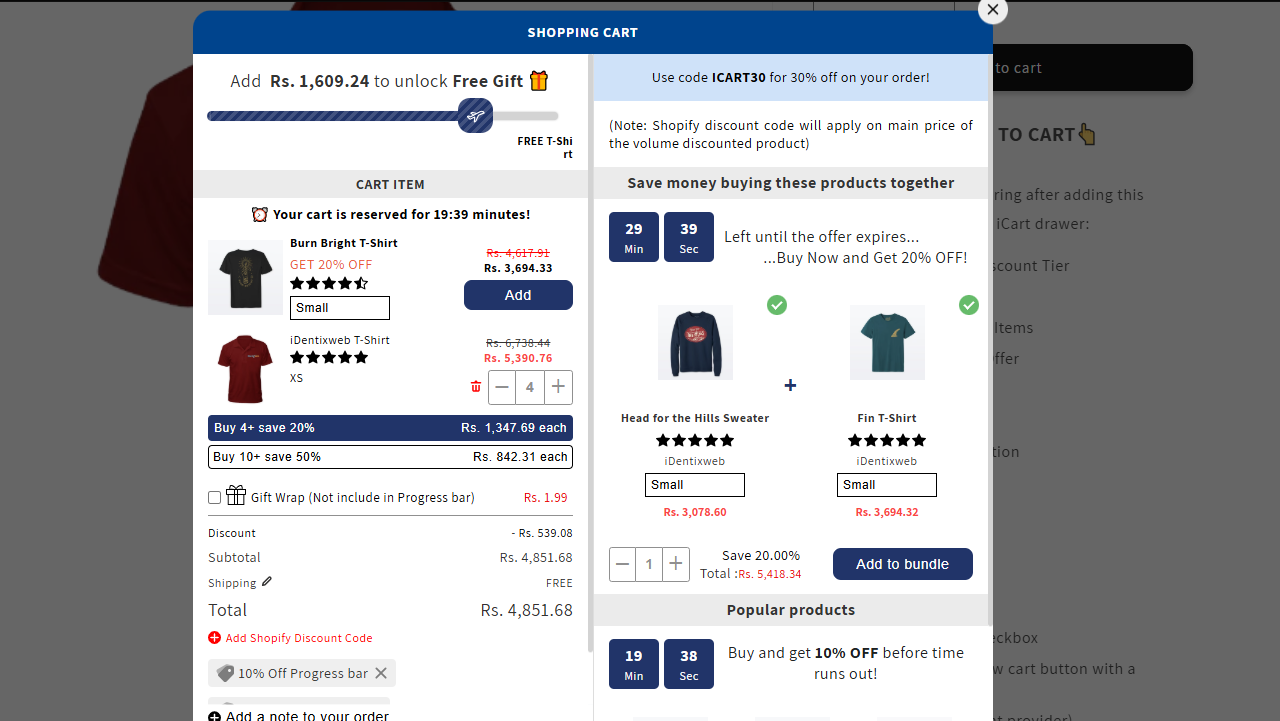
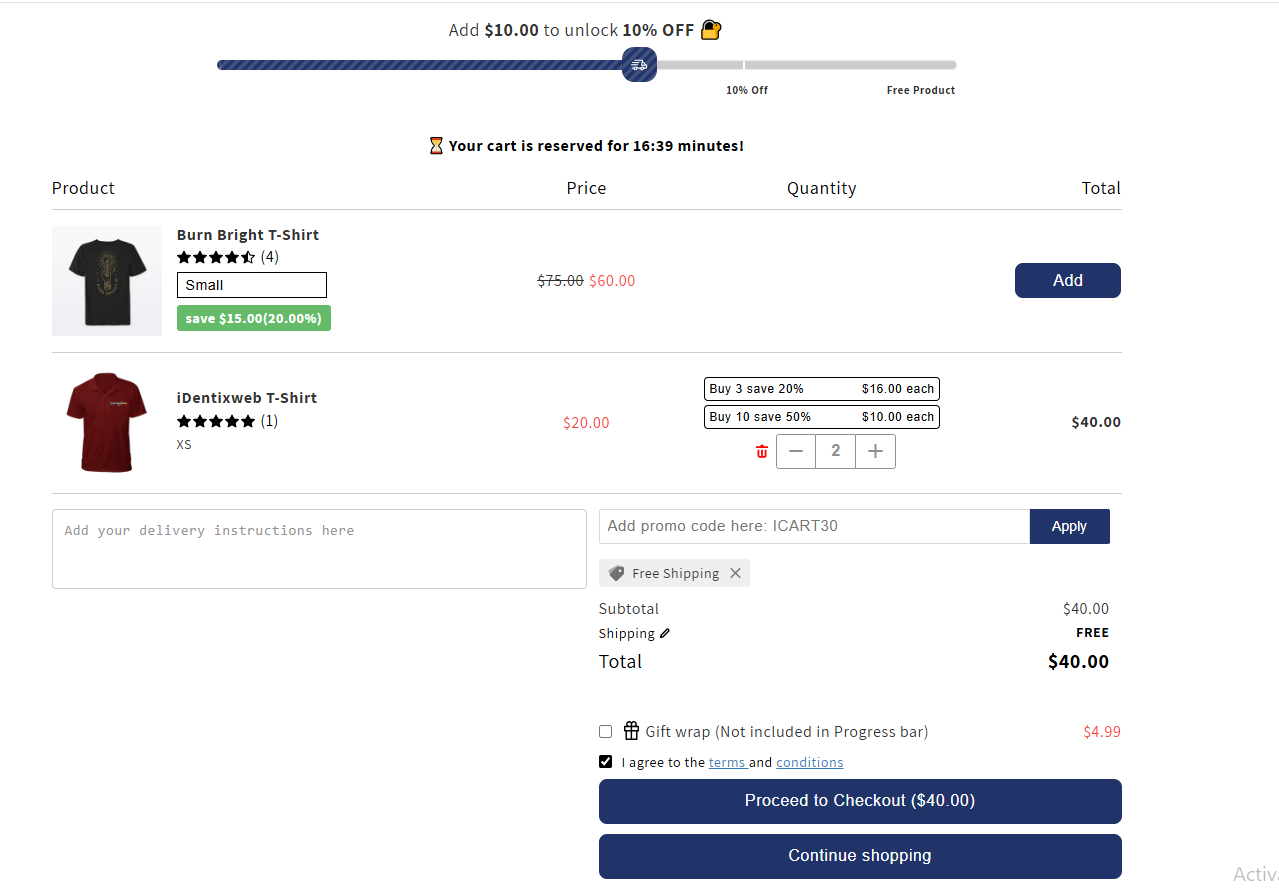
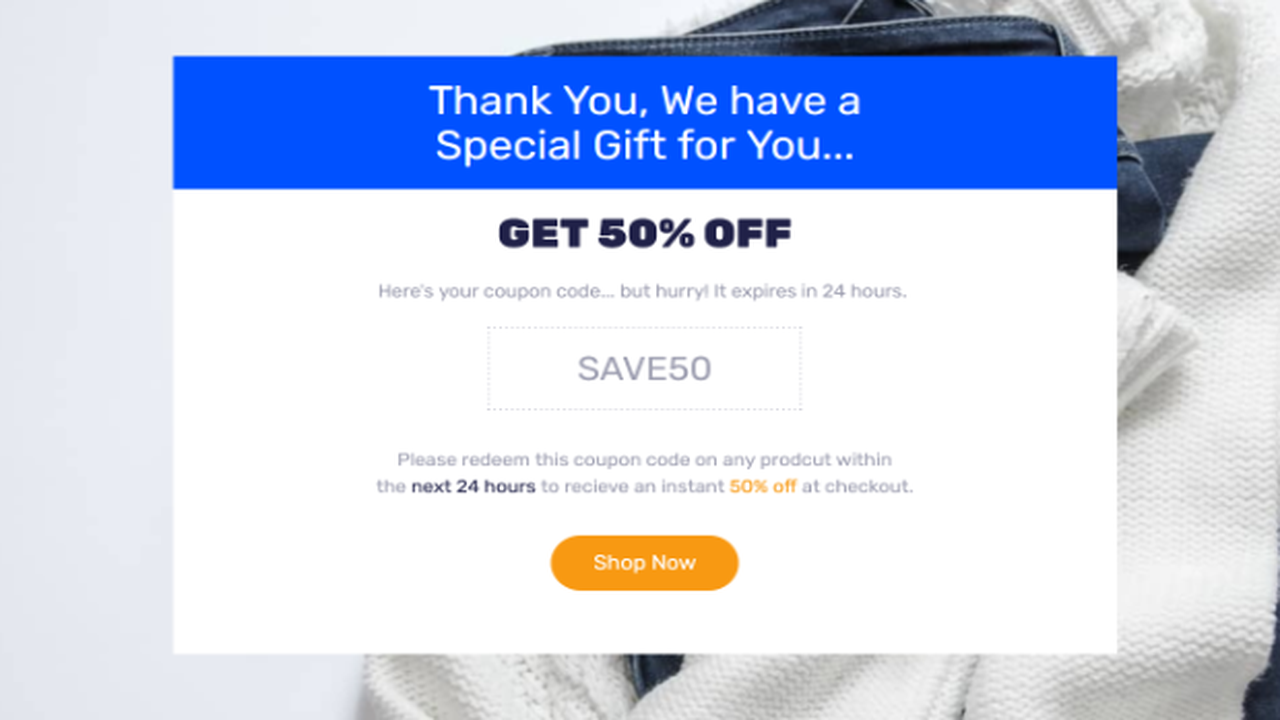
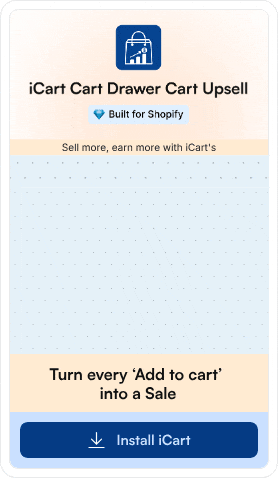
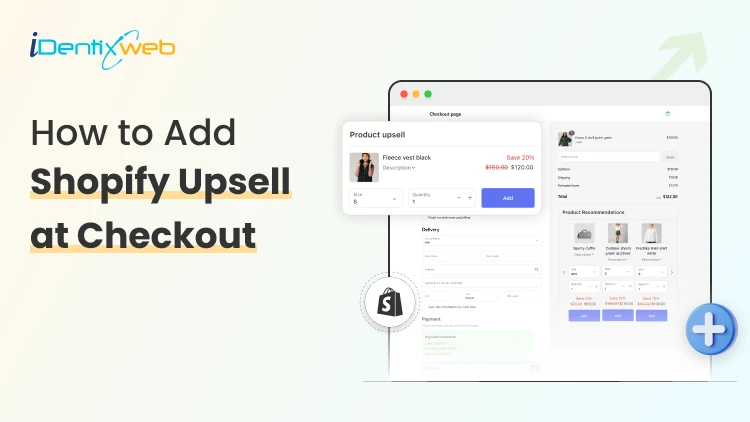
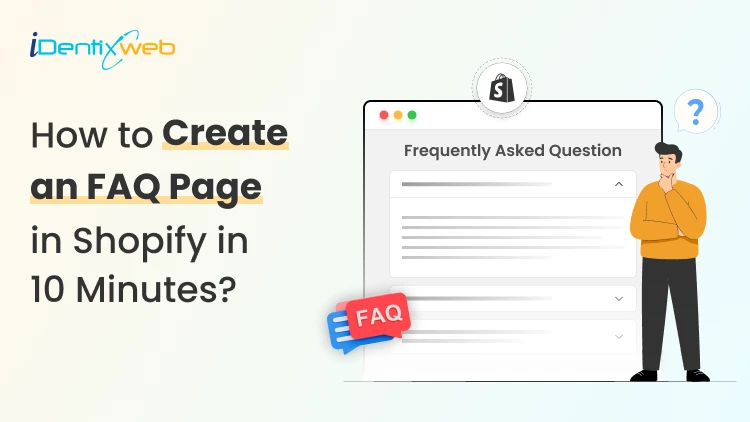
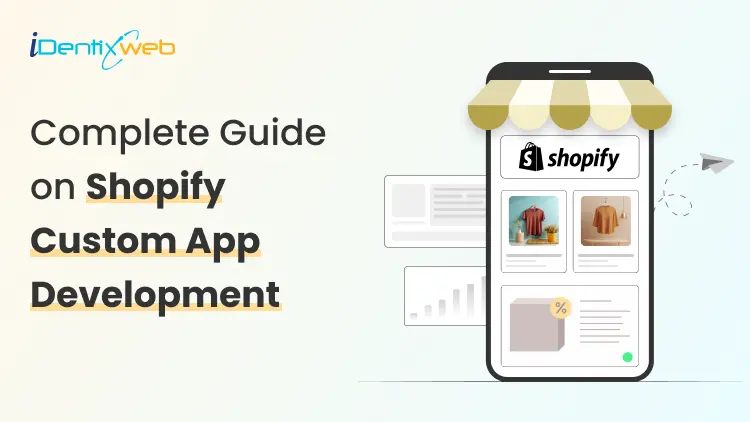

About the author
Vineet Nair
Vineet is an experienced content strategist with expertise in the ecommerce domain and a keen interest in Shopify. He aims to help Shopify merchants thrive in this competitive environment with technical solutions and thoughtfully structured content.